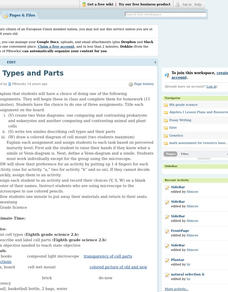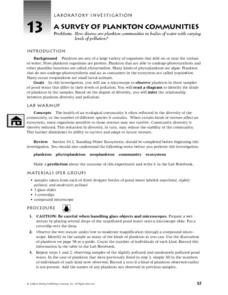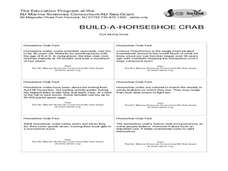Curated OER
Using Microscopes In The Classroom
Get up close and personal with parts of a microscope lesson plans and activities for elementary students!
Virginia Department of Education
A Crystal Lab
Young chemists grow ionic crystals, metallic crystals, and supersaturated crystals in three different lab experiments. Observing these under a microscope allows pupils to compare the various structures.
Curated OER
Exploring Microscopes
Students explore the parts of a microscope. In this microscope lesson, students examine simple and compound microscopes. Students discover how the parts of a microscope work together to generate an image.
Curated OER
History and Development of the Microscope
In this microscope worksheet, students review how microscopes work and how early scientists figured out how microscopes could help them with their discoveries. This worksheet has 3 fill in the blank and 7 short answer questions.
Lincoln Public Schools
Cell Exploration Activities
Engage young biologists in exploring the mysteries of life with this collection of hands-on activities. Enlisting the help of numerous digital resources, students get an up-close look at the structure of plant and animal...
Curated OER
Microscopes and Telescopes
Students analyze a microscope and study what they do. In this investigative instructional activity students study how microscopes were first invented, and how ray diagrams are used in conjunction.
Curated OER
Cell Types and Parts
Eighth graders, after creating a Venn Diagram comparing/contrasting animal and plant cells, writing ten similes describing cell types, or drawing a colored diagram of a cell, list cell types as well as describe and label cell parts. They...
Curated OER
Cells And Their Parts
Students investigate different types and their parts. They differentiate prokaryote and eukaryote cells and create a venn diagram displaying differences or similarities. Students write ten similes related to the cells and parts of them.
Curated OER
A Survey of Plankton Communities
In this biology worksheet, students identify and define the vocabulary terms listed and make a prediction about the outcomes of the experiment. Then they complete the chart of the observations of the plankton diversity in drops of pond...
Curated OER
Sediment Deposition Lab
Students set up a stream table, observe erosion, and record data on where various sizes of sediments settle. They draw conclusions as to what kind of sedimentary rock form in what locations.
Curated OER
Polytene Chromosomes from Salivary Glands
Students use this laboratory procedure to outline the mechanism by which salivary glands are removed and prepared so that the polytene chromosomes may be observed.Drosophila virilis is used instead of Drosophila melanogaster because D....
Curated OER
Build-A-Horseshoe Crab
Students discover many facts about horseshoe crabs. Students identify the main body parts of horseshoe crab. They explore the habits of the horseshoe crab and their importances to the ecosystem. Adaptations for younger students are...
Science Struck
Science Struck: A Study of the Microscope and Its Functions
Uses illustrations with labels to complement a detailed examination of the parts and functions of a light microscope and an electron microscope.
Biology Corner
Biology Corner: Microscope Parts Quiz
This interactive diagram helps students memorize the parts of a light microscope.












